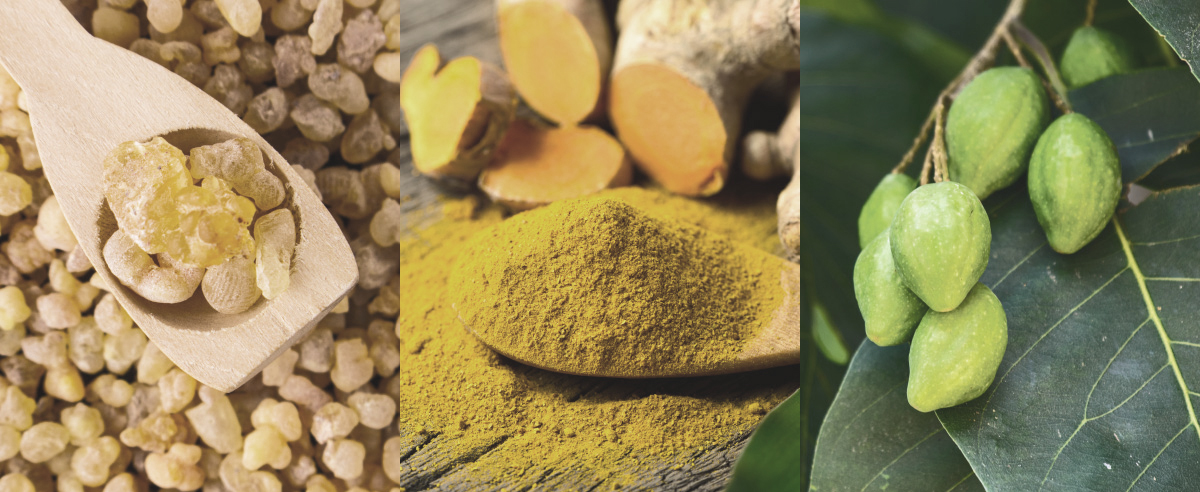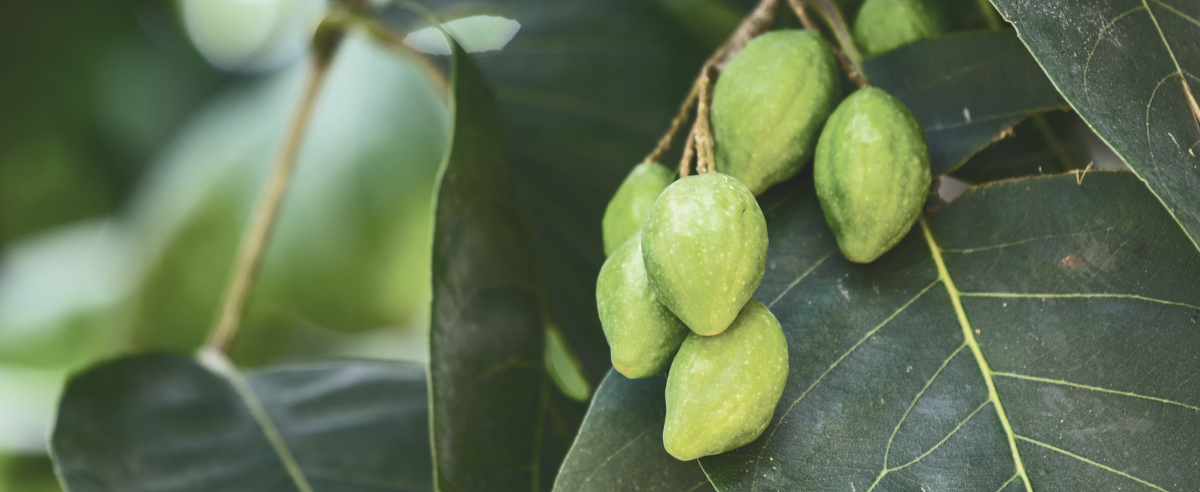











- Recognized as a traditional ingredient in Indian Ayurveda
- Clinical Trial Results (over 8 weeks) : The results indicated a reduction in body fat and weight, a decrease in body mass index (BMI) (notable improvements observed from the 2nd week), a reduction in waist, a reduction in hip circumference, lower total cholesterol (TC) levels in the blood, reductions in low-density lipoprotein (LDL) levels, an increase in high-density lipoprotein (HDL) levels, an increase in adiponectin levels.
- It has been confirmed to inhibit fat synthesis, suppress the differentiation

- Registered as an ingredient in Ayurvedic medicine
- As the Boswellia Serrata Extract blend (Flexir), Boswellia Serrata Extract (2): Curcuma Longa Root Extract (1) : Terminalia Chebula Fruit Extract (2)
- Requires a lower intake than traditional Boswellia Serrata Extract
- Demonstrates inhibition of inflammation and damage to joint and cartilage tissues, as well as suppression of cartilage cell apoptosis
- Clinical results (90 days): Improvement in pain (VAS) from day 14, function (LFI), and arthritis indicators (WOMAC) from day 30

- Listed in pharmacopeias of Korea, China, and Japan
- Registered as a health functional food in the United States and Canada
- Korean traditional medicine: Non-toxic properties, along with protective effects on digestion, colon, and lung function
- It demonstrates anti-inflammatory effects, inhibits cartilage-degrading proteins, and improves cartilage regeneration and structural proteins
- Clinical trials (12 weeks): Showed improvements in adults who experienced pain during daily activities and exercise for 2 weeks, as measured by the mKOOS (a score for assessing joint damage, osteoarthritis progression, and condition)

- A single species of Echinacea purpurea, 100% French origin
- Completed clinical trials targeting Korean participants
- First in Korea to receive approval for enhancing immune function from Echinacea
- Established safety with studies within Korea and animal trials

- The ingredient is cultivated and produced within Korea, ensuring safety and completing clinical trials in Korea.
- This ingredient is one of the 'five ginsengs' mentioned in the 'Bencao Gangmu' recognized for its efficacy comparable to that of wild ginseng.
- Prevents and treats cognitive function disorders
- Confirmed activity in inhibiting neuroinflammation, preventing neuronal cell death, and reducing oxidative stress
- Korean clinical trials (12 weeks): Improvements were observed in language memory (CNT) and digit recall (Digit Span).

- This ingredient is derived from tropical plants used in Indian Ayurveda
- It has been confirmed to inhibit fat synthesis, suppress the differentiation of fat cells, and stimulate thermogenesis and the increase of brown fat.
- Clinical Trials (12 weeks): The results indicated a reduction in body fat, weight, and BMI, a decrease in waist circumference, total cholesterol (TC) levels, and low-density lipoprotein (LDL) cholesterol, an increase in high-density lipoprotein (HDL) cholesterol, a reduction in inflammatory markers (CRP), decreased liver enzyme levels (ALT & AST), and an increase in adiponectin levels.












- Recognized as a traditional ingredient in Indian Ayurveda
- Clinical Trial Results (over 8 weeks) : The results indicated a reduction in body fat and weight, a decrease in body mass index (BMI) (notable improvements observed from the 2nd week), a reduction in waist, a reduction in hip circumference, lower total cholesterol (TC) levels in the blood, reductions in low-density lipoprotein (LDL) levels, an increase in high-density lipoprotein (HDL) levels, an increase in adiponectin levels.
- It has been confirmed to inhibit fat synthesis, suppress the differentiation

- Registered as an ingredient in Ayurvedic medicine
- As the Boswellia Serrata Extract blend (Flexir), Boswellia Serrata Extract (2): Curcuma Longa Root Extract (1) : Terminalia Chebula Fruit Extract (2)
- Requires a lower intake than traditional Boswellia Serrata Extract
- Demonstrates inhibition of inflammation and damage to joint and cartilage tissues, as well as suppression of cartilage cell apoptosis
- Clinical results (90 days): Improvement in pain (VAS) from day 14, function (LFI), and arthritis indicators (WOMAC) from day 30

- Listed in pharmacopeias of Korea, China, and Japan
- Registered as a health functional food in the United States and Canada
- Korean traditional medicine: Non-toxic properties, along with protective effects on digestion, colon, and lung function
- It demonstrates anti-inflammatory effects, inhibits cartilage-degrading proteins, and improves cartilage regeneration and structural proteins
- Clinical trials (12 weeks): Showed improvements in adults who experienced pain during daily activities and exercise for 2 weeks, as measured by the mKOOS (a score for assessing joint damage, osteoarthritis progression, and condition)

- A single species of Echinacea purpurea, 100% French origin
- Completed clinical trials targeting Korean participants
- First in Korea to receive approval for enhancing immune function from Echinacea
- Established safety with studies within Korea and animal trials

- The ingredient is cultivated and produced within Korea, ensuring safety and completing clinical trials in Korea.
- This ingredient is one of the 'five ginsengs' mentioned in the 'Bencao Gangmu' recognized for its efficacy comparable to that of wild ginseng.
- Prevents and treats cognitive function disorders
- Confirmed activity in inhibiting neuroinflammation, preventing neuronal cell death, and reducing oxidative stress
- Korean clinical trials (12 weeks): Improvements were observed in language memory (CNT) and digit recall (Digit Span).

- This ingredient is derived from tropical plants used in Indian Ayurveda
- It has been confirmed to inhibit fat synthesis, suppress the differentiation of fat cells, and stimulate thermogenesis and the increase of brown fat.
- Clinical Trials (12 weeks): The results indicated a reduction in body fat, weight, and BMI, a decrease in waist circumference, total cholesterol (TC) levels, and low-density lipoprotein (LDL) cholesterol, an increase in high-density lipoprotein (HDL) cholesterol, a reduction in inflammatory markers (CRP), decreased liver enzyme levels (ALT & AST), and an increase in adiponectin levels.